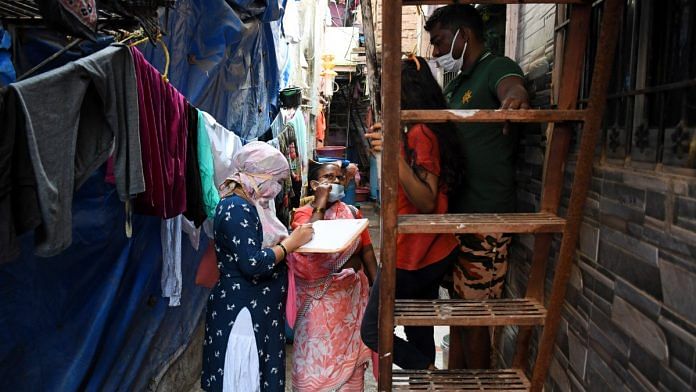New Delhi: The ‘National TB Prevalence’ survey in India, conducted by the Union government and released Thursday on the occasion of World TB Day, has found that a vast majority (64 per cent) of the symptomatic population did not seek healthcare services between 2019 and 2021.
The three-year survey is the first of its kind nationwide since 1955-58, and is only the second national survey aimed at determining the actual disease burden of tuberculosis in the country.
The survey also revealed that the prevalence of tuberculosis among Indians aged above 15 years is 312 cases per 1 lakh population, more than double the global average of approximately 127 cases per 1 lakh people.
Delhi, with 534 cases per 1 lakh population, has the highest incidence of TB, Delhi, which reported the highest incidence of TB, followed by 484 in Rajasthan, 481 in Uttar Pradesh and 465 in Haryana. Kerala has the lowest number with 115 per 1 lakh people.
The survey estimated the point prevalence of microbiologically confirmed pulmonary TB among persons aged 15 years and above in 20 states. It also explored the health-seeking behaviour and estimated the prevalence of TB infection.
A total national sample size of 5,00,000 was calculated, distributed over 625 clusters with 800 population per cluster. All eligible study participants underwent symptom screening using a standard questionnaire and chest X-ray screening.
TB, which is highly infectious, has been India’s longest standing health challenge, with the twin challenges of malnutrition and crowding creating fertile ground in the country for the spread of the disease. The TB bacteria is known to reside in humans for long periods without causing sickness, so long as their immunity levels are high, but whenever they are in an immunocompromised state, the disease can manifest.
Also Read: This World TB Day, a look at how an Indian PPP initiative made it to WHO list of best practices
‘For every 284 cases, around a 100 are reported’
An alarming finding from the survey was that 64 per cent of the symptomatic population did not seek healthcare services. The reasons cited by people included ignoring the symptoms (68 per cent), not recognising the symptoms as TB (18 per cent), self-treatment (12 per cent) and inability to afford to seek care (2 per cent).
Among the 36 per cent of survey participants who sought care for their symptoms, there was equal preference for government and private facilities.
The survey found that the prevalence-to-notification ratio of pulmonary TB in adults is about 2.84, which means for every 284 cases that happen in the country, only around a 100 are reported. This despite the fact that in 2012, India made it mandatory for all cases of TB to be notified. Doctors can be punished with jail time for not doing so, hence it is more likely that these are patients who are not currently being treated.
“(The) survey showed that among the diagnosed TB cases, 12 per cent were already on treatment and 23.3 per cent had a history of TB treatment, hence close follow-up of patients completing treatment for early detection of recurrent TB and planning of interventions for preventing recurrence of TB is needed,” the report said.
“Patients have high trust in the common facilities; it provides opportunity to strengthen quality of care in government health centres if complemented by the private sector,” it added.
‘Committed to TB eradication by 2025’
At the function in Vigyan Bhawan to mark World TB Day, where the survey report was released, dignitaries reiterated India’s commitment to achieve the target of ending TB by 2025, five years ahead of the global schedule.
Minister of State (Health) Bharti Pravin Pawar talked about how the Covid-19 experience has helped India hone its battle against TB, while Uttar Pradesh Governor Anandiben Patel urged all to adopt one TB-stricken child each to ensure they get adequate nutrition.
Science and Technology Minister Dr Jitendra Singh said genomic surveillance will be used for TB surveillance too. He announced the launch of the ‘Dare to Erase TB’ programme, which will be based on Indian data, and the formation of a Genome Sequencing Consortium for WGS (Whole Genome Sequencing) TB surveillance. He also highlighted efforts of the Ministry of Science & Technology in disease biology, drugs discovery and vaccine development to remove the scourge of TB from the country.
India has the world’s highest burden of drug resistant TB. Health Minister Mansukh Mandaviya said that despite the pandemic disruptions, India would meet the 2025 deadline originally set by Prime Minister Narendra Modi in 2018.
(Edited by Gitanjali Das)
Also Read: Covid left big gap in TB reporting, Modi govt looks to fill it with special door-to-door drive



